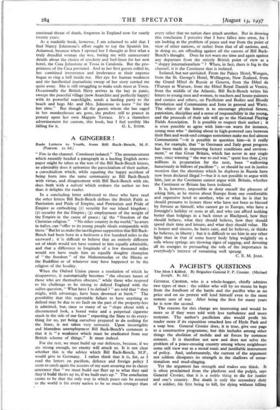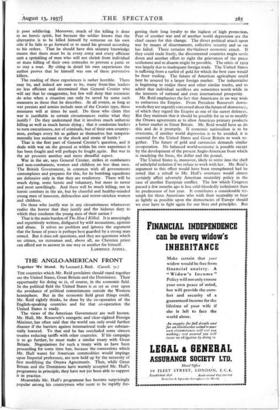A PACIFIST'S QUESTIONS
The Men I Killed. By Brigadier-General F. P. Crozier. (Michael Joseph. 8s. 6d.)
GE%ERAL CROZIER, who is a whole-hogger, chiefly admires two types of men : the soldier who will by no means be kept from the forefront of the battle and the pacifist who at no price and on no pretext will lend himself even to the most remote uses of war. After being the first for many years he is now the second.
The reasons for this change are interesting and would be more so if they were told with less turbulence and more restraint. The author's pacificism also would profit his reader more if its exposition smacked less of Hyde Park and a soap box. General Crozier does, it is true, give one page to a constructive programme, but this includes among other things the abolition of mobile and air forces by common consent. It is therefore not new and does not solve the problem of a peace-ensuing country among whose neighbours some still view war as a moral tonic and justifiable instrument of policy. And, unfortunately, the current of the argument not seldom dissipates its strength in the shallows of sensa- tionalism and mud-slinging.
Yet the argument has strength and makes one think. It is often proclaimed from the platform and the pulpit, says General Crozier, that it is a noble thing to die for justice and one's country. But death is only the secondary duty of a soldier, his first being to kill, for dying without killing
is poor ,soldiering. Moreover, much of the killing is done in no heroic spirit, but because the soldier knows that the alternative is to be killed himself by someone on his own side if he fails to go forward or to stand his ground according to his orders. That he should have this salutary knowledge means that there must be m every army and every efficient unit a sprinkling of men who will not shrink from individual or mass killing of their own comrades to prevent a panic or to stay a rout. By citing in detail his own experiences the author proves that he himself was one of these preventive killers.
. The reading of these experiences is rather horrible. There may be, and indeed are sure to be, many front-line leaders no less efficient and determined than General Crozier who will say that he exaggerates, but few will deny that occasions do arise when a situation can only be saved by some such measures as those that he describes. At all events, as long as war persists and armies include men of the Crozier type, those measures will at times be used. Do those who claim that war is justifiable in certain circumstances realise what they justify ? Do they understand that it involves much unheroic killing as well as much heroic dying ; that it condemns leaders to.turn executioners, not of criminals, but of their own country- men, perhaps every bit as gallant as themselves but tempera- mentally less resistant to the shock and strain of battle ? _ That is the first part of General Crozier's question, and it deals with war on the ground as within his own experience it has been fought and will perhaps be fought again. But war in the air presents another and more dreadfid aspect.
War in the air, says General Crozier, strikes at combatants and non-combatants, women and children no less than men. The British Government, in common with all governments contemplates and prepares for this, for its bombing squadrons are defensive only in that they are retaliatory. There will be much dying, some heroic and voluntary, but more in terror and most unwillingly. And there will be much killing, not in hetoic combats in the air, but by cheerful and healthy-minded young men of innocent, defenceless and terror-stricken women and children.
Do those who justify war in any circumstances whatsoever realise the horror that they justify and the hideous duty to which they -condemn the young men of their nation ?
That is the main burden of The Men I Killed. It is annoyingly and repetitively written, disfigured by wild accusations, egotism and abuie. It solves no problem and ignores the argurdent that the house of peace is perhaps best guarded by a strong man armed. But it does ask questions, and they are questions which no citizen, no statesman and, above all, no Christian priest can afford not to answer in one way or another for himself.
LAWRENCE ATHYLL.







































 Previous page
Previous page